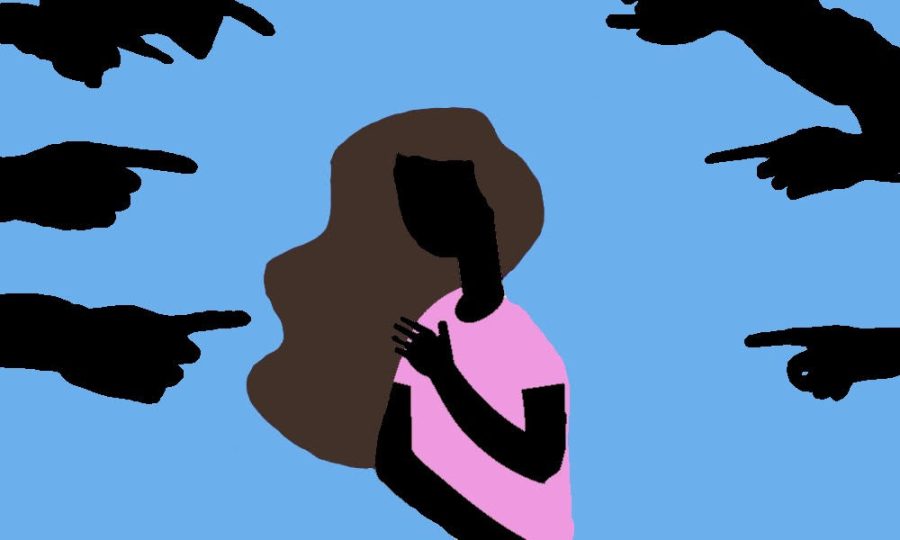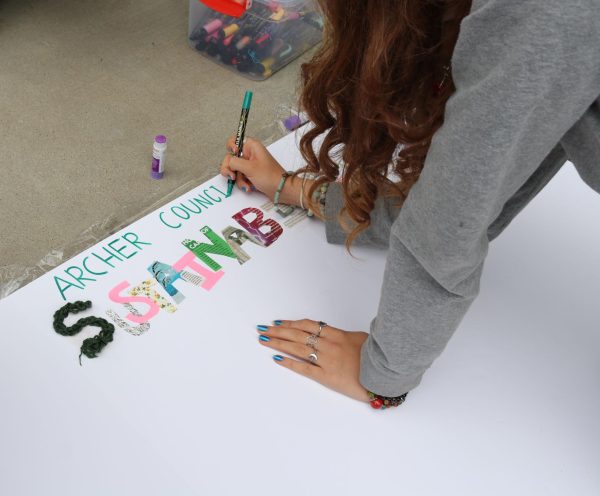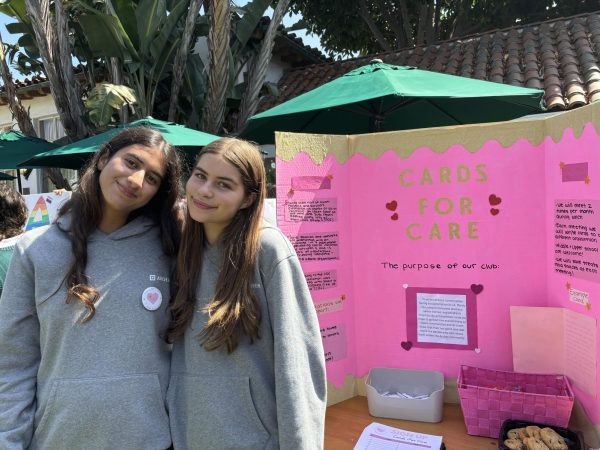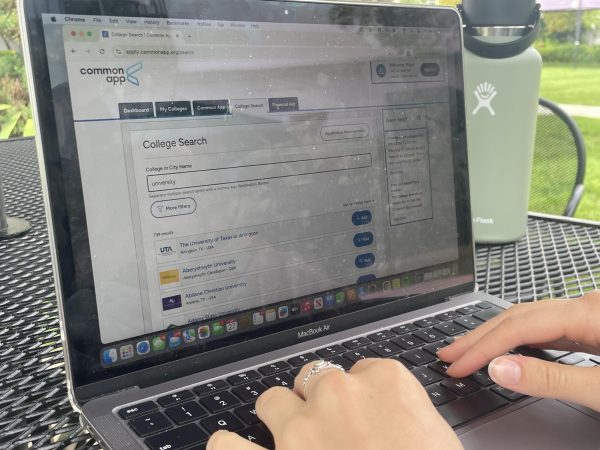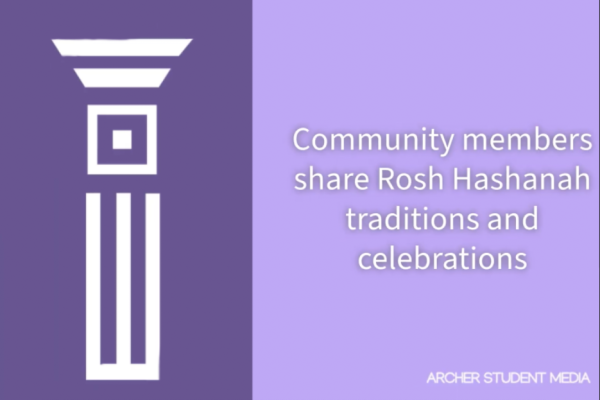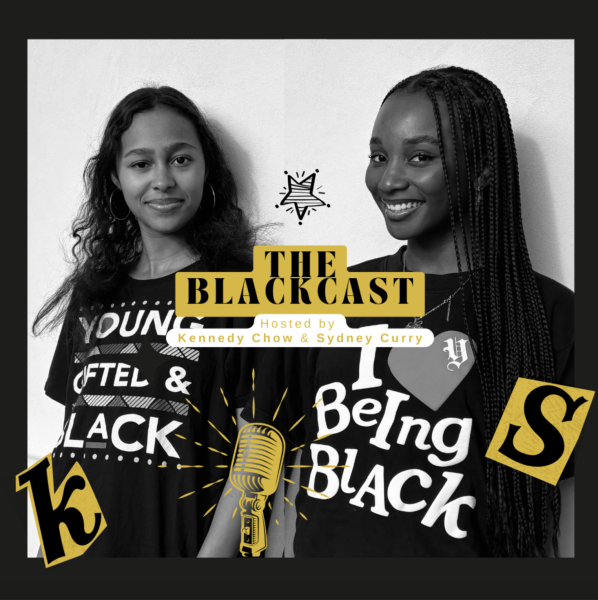Archer students reflect on peer pressure’s impact, professionals describe psychological effects
Photo credit: Lola Thomas
A graphic illustration depicts a teen girl being pointed at, feeling peer pressure. According to Firewall Times, 85% of high school students have felt peer pressure during middle or high school. (Graphic Illustration by Lola Thomas)
When middle and high school students at Archer answered the question, “What does peer pressure look like to you?” posed in a survey by The Oracle, some of their answers included “wearing Converse,” “breaking the dress code” or a “nonexistent social construct.”
Social peer pressure is an experience that can affect people of all ages, backgrounds and identities. However, it is particularly prevalent in teen girls who are trying to develop their individuality and fit in with their social or age group. Peer pressure can lead to acting a certain way or doing things to win the approval of a certain person or group.
Merriam-Webster defines peer pressure as “a feeling that one must do the same things as other people of one’s age and social group in order to be liked or respected by them,” but psychologist Brett Laursen explained that its definition has changed and become more complex over time.
Laursen suggested that peer pressure begins as early as elementary school and intensifies throughout middle and high school. According to Laursen, peer pressure can work as a positive influence as a way for one to better themself, and some peer pressure can influence another to act badly. Peer pressure could be a result of children and teens trying to “protect” friendships they value and win their approval and validation.
Social Media’s Impact on Peer Pressure
According to Mayo Clinic, peer pressure and bullying have worsened with teens’ increased use of social media. A 2019 study of approximately 12,000 13-16-year-olds in England found that using social media frequently can worsen a teen’s mental health and self-esteem. Licensed Clinical Social Worker and Psychologist Dr. Amy Clayton said peer pressure and social media go hand-in-hand.
“It’s hard to get away from — [if] you are seeing pictures of all of your friends who didn’t invite you to a party and they’re posting it, nobody talks about it,” Clayton said. “[Peer pressure] doesn’t need to be a frontal assault.”
Clayton said social media provides a more accessible platform for someone to peer pressure another person, making the situation more complex, as the peer pressure isn’t done face-to-face but still has a lingering impact.
“People are able to hide behind a screen and do a lot of damage because they’re not in person to face the consequences of or the reaction of the people that they’re hurting,” Clayton said. “It’s just made it progressively worse.”
School counselor Jamie MacDonald also highlighted the negative impact social media has on peer pressure, specifically regarding to the idea of feeling pressured to mimic others and their behavior.
“Because of likes and sharing videos, just Tiktok actually, at its core is essentially mimicking other people’s behaviors — the more likes and the more views that someone gets, the more we may think that this is the desired behavior or outcome,” MacDonald said. “[We might] desire clothes because someone else has it— [we have to] check in with ourselves and say, is this authentically mine?”
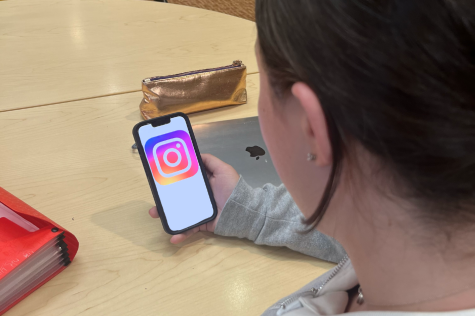
Eighth grader Beatrice Washburn said social media worsens peer pressure because it provides a platform for comparison.
“Often people post pictures of themselves and you can feel like, ‘I’m so boring while they’re doing this thing, and I’m chilling at my house,’ it can really affect people’s mindsets,” Washburn said.
Freshman Selah Johnson said social media has impacted how she views peer pressure since social media’s standards of what a teen girl should look or act like have changed.
“[Social media] plays a big role in growing up, especially for teen girls with things like beauty standards, navigating friendships relationships and things like that,” Johnson said. “For me, a lot of that came into play during middle school, when I started to come into the world of social media.”
Johnson said peer pressure can often be misrepresented or exaggerated in media and perpetuate stereotypes about teen girls.
“There’s an indirect type of peer pressure — which is what we see in movies,” Johnson said. “It’s more spoken, and it’s an immediate kind of influence that you have to make a choice right now if you go along with other people.”
Peer Pressure in All-Girls Schools
According to Waldegrave, girls experience peer pressure more than boys. Out of 497 Archer students, 71 responded to the statement “Peer pressure is worse at an all-girls school” and rated the statement from strongly agree to strongly disagree. Almost half of responders said they were neutral, and 28.2% of responders said they disagreed. MacDonald said peer pressure cannot be categorized, and it can happen anywhere.
Clayton also said peer pressure could happen in any space, but she has noticed it more in coed communities since there is a greater variety of cliques or friend groups.
“There’s this tendency to want to show off in front of other groups, and I have seen many kids try and bully people to look like they’re the queen bee,” Clayton said.
Washburn said that peer pressure is something she experiences frequently. She said peer pressure often happens without noticing it at the moment, but it can still have great effects in the future.
“For me, peer pressure can be completely unconscious — it can be conscious too, but the majority of the time, people aren’t aware that it’s happening,” Washburn said. “It’s in such small amounts that if you notice, you’re like, ‘Wow, I really changed what I do for this one person.'”
About 30% of freshmen surveyed reported peer pressure is not a negative experience at an all-girl school. Freshman Serenity Jones attended a coed school before she attended Archer, and she said being at an all-girls school has made peer pressure more manageable.
“It made it better because now I can recognize when it’s happening,” Jones said. “I’m not saying it happens a lot, but when it does, I’m able to recognize it faster.”
Johnson said peer pressure can come in another indirect form that still brings pressure among other people without being explicit. She said peer pressure doesn’t always have to be blatant or mean-spirited.
“Indirect peer pressure is like seeing people around you doing the same thing, and you feel the pressure to go with that standard,” Johnson said. “It’s not like you’re being forced into anything, but you still feel that influence — it’s just unspoken.”
Sophomore Kennedy Chow said being in an all-girls environment has been comfortable for her, and peer pressure often appears as a result of acting a certain way around men.
“Since we’re all girls here, we all do what we want,” Chow said. “But, there are still trends that may affect us to act in the male gaze.”
The concept of peer pressure can also have positive effects on teen girls through motivation and enthusiasm. Johnson said good peer pressure exists, and sometimes it can be helpful to friends who need encouragement.
“I think there’s a positive peer pressure in terms of friends being great role models, they can pressure you to try new hobbies or interests,” Johnson said. “You may not feel comfortable at first, but a lot of the time positive peer pressure can open your world up.”
Jones highlighted the importance of not peer pressuring others, as well as not letting yourself get peer pressured. She said that it is vital to be kind to everyone you encounter.
“I just let people live their life, and I just live my life,” Jones said. “Don’t peer pressure — it can have a bigger impact than you may think.”

Lola Thomas joined The Oracle as a staff reporter in 2022, became a senior reporter in 2023 and became the culture editor in 2024. She runs her nonprofit...



